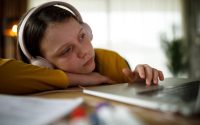Late-night screen time causes ‘social jet lag,’ psych issues
If a teenager is wrestling with emotional issues, maybe they’re suffering from “social jet lag.”
Social jet lag is the difference between our body’s natural sleep needs (or chronotype) and the time that social tasks — including social media — keep us awake.
Health experts have now found that late-night screen time is a primary cause of social jet lag, which then greatly increases the risk of psychological problems among teens.
“Screen use before sleep was associated with later chronotype and then greater social jet lag, which was further related to higher levels of emotional problems,” wrote the authors of the study, published in the Journal of Affective Disorders.
Researchers gathered data from two different surveys conducted among more than 4,000 Chinese high school students.
Survey participants reported their screen use before sleep, their chronotype — the body’s innate sleep schedule — and any emotional problems they might be experiencing.
The researchers found that teenagers who used screens, including cellphones, tablets and computers, before sleep tended to have a later chronotype and experienced greater social jet lag.

This greater degree of social jet lag, and the disruption of their natural sleep rhythms, puts adolescents at a higher risk of emotional or psychological problems.
Additionally, the study revealed that teenagers with later chronotypes had difficulties coping with early social schedules, such as early school start times. This misalignment exacerbated social jet lag and psychological issues.
The study highlights the importance of encouraging healthy screen habits among adolescents and being mindful of their natural sleep patterns to support their mental health.
“The findings suggested that healthy media-use habits should be developed, and intervention strategies targeting circadian characteristics should be designated to promote emotional health in the adolescent population,” the study authors wrote.

Among the limitations of the study, the authors acknowledged, is the fact that the survey data relied on self-reporting from the study participants, which could be subject to reporting bias and participants’ recall errors.
A number of health issues have been linked to irregular sleep schedules, especially among “night owls” whose chronotype leads them to stay up into the night and sleep late.
Recent research has found one reason night owls often have worse health: They tend to do more smoking and drink more alcohol than those who rise and shine earlier.
Earlier research has also found that exposure to blue light emitted by electronic screens can disrupt circadian rhythms, leading to delays in falling asleep, among other health issues.
That’s especially true when the screen content is stressful news or anxiety-provoking social media posts, a practice known as “doom scrolling.”


